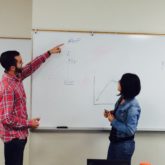Applications of Behavioral Game Theory and Finance
Description of the Course
This course considers how new developments at the intersections of economics, finance, and psychology help us understand consumer and investor decisions. Recent work in behavioral economics uses experimental studies of how real people learn and behave to develop economic models of decision-making and performance. Behavioral game theory applies these techniques in settings with strategic interaction. Behavioral finance applies these techniques to decisions and performance in financial markets. The course emphasizes applications and is aimed primarily at Ph.D. and M.A. students in Economics, but should also appeal to those from Politics and Policy or Management, who have had some previous exposure to economics.
Course Objectives
Upon success completion of this course, you will be able to:
- Demonstrate knowledge of key ideas and concepts in behavioral economics.
- Apply methodologies in behavioral game theory and behavioral finance.
- Synthesize and analyze the implications of existing knowledge and produce a high quality paper.
Notes: This course is usually taught in the Spring term.
Experimental Economics
Description of the Course
This course reviews the literature in an effort to give the student a working knowledge of experimental techniques. Experiments in economics are used to generate data for the purpose of testing theories and establishing causal relationships. Instead of collecting historical data to test theories or establish empirical regularities, experimentalists get their data from observations in controlled environments. In this class we will discuss both laboratory and field experiments, although more emphasis will be given to laboratory methods. While the areas of application will vary, the course is research oriented and best suited for those enrolled in the Economics PhD program.
Course Objectives
In this course you will:
- Analyze and evaluate research that build on current knowledge.
- Develop research skills and the ability to present research findings to an academic audience.
- Design experiments that produce quality data to answer research questions.
Notes: This course is usually taught in the Fall term.
Behavioral Economics Incubator I&II
Description of the Course
This course is designed to help students acquire practice in designing and implementing laboratory and field experiments. The ultimate objective of the incubator is to produce a publishable paper in collaboration with faculty and fellow students. We will achieve this objective in a collaborative environment that emphasizes team work.
Course Objectives
In this course you will:
- Review best practices for experimentation including the design, collection, and storage of human subject data.
- Learn about how to get funding for research.
- Design and implement an experiment.
Notes: This course is taught with Prof. Joshua Tasoff every second year.
Additional Courses
- Microecononic Theory
- Game Theory and Asymmetric Information



